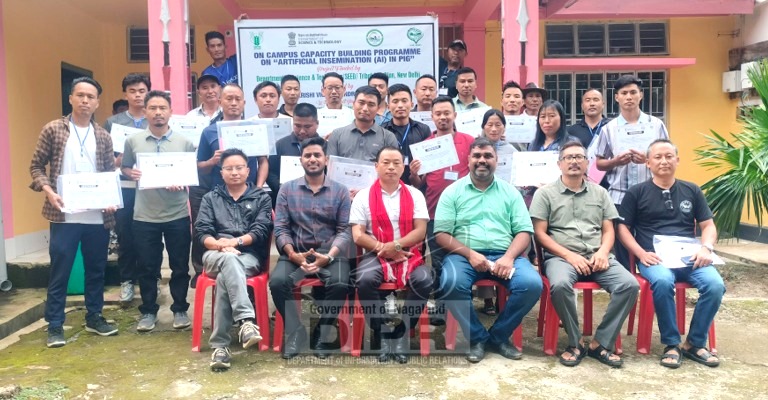KVK Wokha organises three-day on-campus capacity-building programme on artificial insemination technology in pigs.
Share

DIMAPUR — Indian Council of Agricultural Research-Krishi Vigyan Kendra, Wokha, organised a three-day on-campus capacity-building programme on ‘Artificial insemination (AI) technology in pigs’ from August 27 to the 29th at its conference hall.
According to a DIPR report, the training was conducted under an externally funded project supported by the Department of Science & Technology (DST), Government of India.
The programme witnessed active participation from 25 farmers, rural youth, and field functionaries representing seven districts of Nagaland—Longleng, Mokokchung, Wokha, Kiphire, Shamator, Tseminyu, and Tuensang.
Designed to promote both skill enhancement and attitudinal change, the training incorporated innovative pedagogical approaches such as micro-lab exercises, SWOT analysis, group activities, lectures, live demonstrations, laboratory procedures, and interactive sessions that encouraged active engagement from participants.
Technical sessions were delivered by a team of experts including Dr. Moakum Pongen; Dr. Yanben Kikon (Veterinary department); Dr. N Khumdemo Ezung; Senior Scientist & Head, ICAR-KVK Wokha, Dr. Sandeep Deshmukh; Dr. Mhalo Tungoe; Dr. Lily Ngullie, and Anuranjan Singh (Skill Officer, DC Office Wokha).
Also read: Slice Small Finance Bank opens branch in Wokha
The lectures and demonstrations covered key topics such as artificial insemination techniques and reproductive management in pigs; feeding and nutritional strategies with emphasis on maize and concentrate feed formulation; preventive disease management with special reference to African swine fever; hygienic pork production and pig farm waste utilisation, small-scale pig breeding systems, and entrepreneurship development in piggery.
The closing ceremony was attended by Echungbemo Erui, SDO (Civil), Wokha, as the special guest.
In his address, the special guest emphasised the urgent need to adopt scientific piggery practices in Nagaland, noting that pig rearing is both a cultural tradition and a vital source of livelihood.
Erui commended KVK Wokha for promoting advanced reproductive technologies at the grassroots level and encouraged participants to become ambassadors of change in their respective districts.
The skill officer highlighted the importance of aligning skill-based training with entrepreneurship and livelihood promotion, enabling rural youth to establish enterprises, access government schemes, and generate employment opportunities.
Dr. Deshmukh stressed that AI in pigs holds immense potential to improve productivity, enhance genetic quality, and bridge the growing demand-supply gap of pork in the state. He assured continued technical support and follow-up from KVK.
The programme concluded with the distribution of certificates, marking a significant milestone in strengthening the piggery sector through science-led interventions and capacity building under DST support, the report stated.